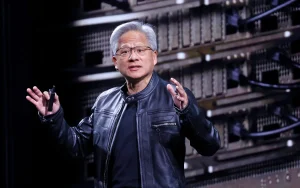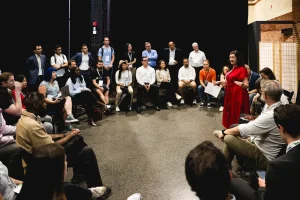AI and the Future of Work Advances, Challenges, and Ethical Implications

AI is advancing rapidly and it’s both exciting and scary. It’s creating opportunities but also raising concerns about job loss.
The conversation about AI often focuses on its potential to displace jobs, impacting the less fortunate the most. Companies like Duolingo are already using AI to change how they operate.
The Impact of AI on Employment
The discussion around AI and job automation is heating up. It focuses on a billionaire’s prediction that AI will leave many without work, especially impacting the less educated. This forecast signals a future where low-skilled jobs might disappear, creating a challenging landscape for those unable to adapt.
AI technology is advancing, and companies like Duolingo are embracing it head-on. The company’s CEO openly discusses the potential for AI to take over jobs, even enjoying the luxury of tacos and margaritas while doing so. This paints a stark picture of the divide between those who benefit from AI and those who suffer.
The Risks and Realities
While AI can streamline workflows and improve efficiency, not all jobs are easily replaceable. The shift mainly threatens roles involving repetitive tasks. Larger discussions reveal discomfort among workers who see AI as a threat to job security, and not without reason. AI is here and evolving fast.
As AI takes over menial tasks, CEOs are facing backlash for replacing human workers. This shift isn’t going unnoticed. Public figures have been criticized and labeled unsympathetic for celebrating layoffs facilitated by AI. Many see this as a moral issue as much as a technological one.
AI’s Influence Beyond Borders
AI’s impact is not limited to wealthy nations. The less fortunate and those in developing countries could be hit hardest. There’s a growing fear that AI will widen the gap between the rich and poor, both inside and outside of the United States.
AI adoption means more jobs could be lost in sectors where workers have little power to push back. It’s crucial to consider how global economics and social structures are interwoven with AI advancements. Companies may save money, but at what cost to society?
Experts warn of potential global repercussions as AI transitions from assisting roles to replacing them altogether. Many countries could face increasing unemployment, leading to socio-economic instability. These changes push the need for new, adaptable job markets.
The Ethics of AI in Business
There’s a balance to strike between business efficiency and ethical responsibility. Some business leaders celebrate AI’s integration without considering its human cost. This shortsightedness could result in eroding trust and brand image, as customer perceptions shift towards empathy over efficiency.
The use of AI necessitates thoughtful decision-making. Companies must weigh their objectives against societal impact, ensuring that automation doesn’t lead to negative long-term consequences. Genuine empathy in leadership could serve as a strong differentiator for businesses moving forward.
AI’s Role in the Future of Learning
AI’s potential in education sparks debate. Some argue AI can never replace human tutors due to its inability to read emotion or body language. However, AI’s ability to analyze vast data could enhance learning by personalizing educational experiences.
Innovative tech like emotionally intelligent AI shows promise in bridging the empathy gap. These systems are capable of recognizing emotions such as frustration or joy, suggesting a future where AI could support teachers rather than replace them.
This shift could revolutionize educational accessibility, making it easier for learners worldwide to receive personalized attention. However, the debate isn’t settled, and many educators remain wary of relying too heavily on technology.
The Path to Autonomous AI
AI is currently limited by its lack of autonomy, but not for long. Future advancements may bring AI systems that can proactively accomplish tasks without human input. This kind of progression is both exciting and intimidating.
The potential for AI to become autonomous brings both opportunities and challenges. It hints at an impending shift in job responsibilities, demanding new skill sets and possibly reshaping entire industries. The future will require adaptability from workers and executives alike.
Conclusion
In summary, AI’s evolution is fast-paced and multifaceted. While it can drive impressive progress, it also poses significant challenges. Balancing innovation with empathy and ethical action will be key in navigating this new landscape.
AI’s advancement will continue shaping the job market and society at large. Awareness and adaptability are essential in facing these changes. By prioritizing ethical considerations, businesses can help ensure a future where technology enhances rather than hinders human potential.








